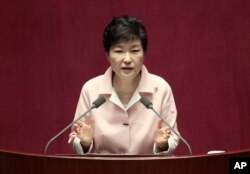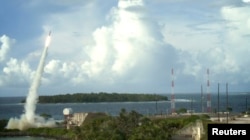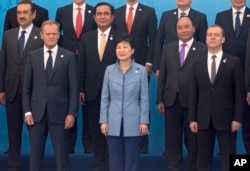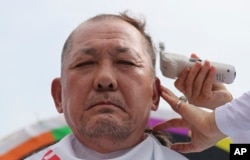Thousands of residents from the planned deployment site of the U.S. Terminal High Altitude Area Defense (THAAD) missile defense system rallied in the South Korean capital Thursday to denounce the system as a health and safety threat to their communities.
Peace activists also held a press briefing in Seoul to make the case against the THAAD system on national security grounds, saying it will escalate regionals tensions, alienate Chinese and Russian support for North Korean sanctions and validate Pyongyang’s nuclear program.
South Korean President Park Geun-hye defended the decision to deploy THAAD and urged her nation to stay united in the face of the growing North Korean nuclear threat.
"If we continue to be divisive and social confusion grows about a decision we had no choice but to make to protect the country and the lives of our people, it would be exactly where North Korea wants us to go," Park said.
Deterrence
The Kim Jong Un government remains defiant in the face of harsh international sanctions imposed after its fourth nuclear test and a long-range rocket launch this year.
North Korea has launched numerous missiles in the last few months to improve the capabilities of its weapon systems and there is reported activity at the country’s nuclear site indicating another test may be in the planning stages.
The THAAD system is designed to intercept incoming high altitude missiles. The government contends it will be effective in protecting much of the country against a North Korean missile attack.
Opponents, however, said the military benefits of THAAD are not significant and point out that areas like Seoul, which are close to the North Korean border, remain vulnerable to low altitude missiles and artillery attacks.
The South Korean military said it is working to increase its Patriot missile defenses for these areas.
Diplomacy
While THAAD may not alter the balance of military power on the Korean peninsula, peace activists said it will undermine broad international support to pressure the North to return to nuclear disarmament negotiations.
“[South Korea] has lost the strategic trust it has been building with China and Russia," said Lee Hae-jeong, a professor international politics at Chung-Ang University and activist with the group, Peace and Disarmament Center of People’s Solidarity for Participatory Democracy.
China and Russia supported harsh United Nations sanctions on North Korea for its nuclear test this year, and have called on Pyongyang to end its banned nuclear and missiles tests.
But Beijing and Moscow also denounced THAAD as an attempt to increase U.S. military power in the region and use the system’s powerful radar to monitor their military installations.
Rather than strengthening South Korean security, opponents worry THAAD will further divide the region, and make China and Russia more likely to support a nuclear North Korea.
Local fears
Many of the estimated 2,000 demonstrators that gathered in Seoul on Thursday were residents from Seongju country, near the designated THAAD deployment site. Among them was the governor of Seongju, who shaved his head in protest.
Many Seongju residents are concerned that electromagnetic radiation from the powerful radar system used by THAAD could cause serious harm to nearby residents and contaminate agricultural products.
The South Korean and U.S. militaries have tried to refute these claims by publicly conducting tests of a THAAD system in Guam and a Patriot missile defense system in the south of Seoul that use the same radar. In both cases emissions fell within safety standards. The government assured local residents that THAAD would be located 1.5 kilometers away from populated areas.
But opponents question the validity of these tests and are angry about the lack of transparency in the assessment and selection process.
"It is the South Korean government's way of dealing with the THAAD dispute that [the residents] must accept the unilateral decision of the government," Said Park Jung-eun, a leader of the group, People’s Solidarity for Participatory Democracy.
Last week, when the South Korean prime minister visited Seongju to address local concerns over THAAD, he was shouted down by angry protesters and pelted with eggs and water bottles and his bus was surrounded and blocked for several hours.
Youmi Kim in Seoul contributed to this report.









